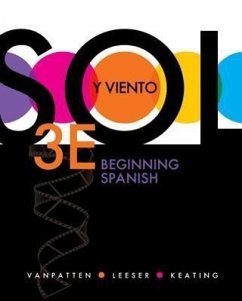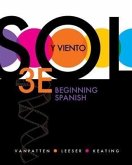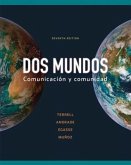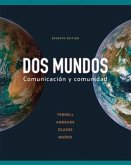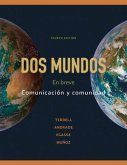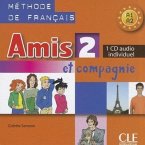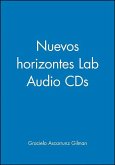Bill Vanpatten, Michael Leeser, Gregory D Keating, Tony Houston
Audio CD Program Part 1 for Sol Y Viento
Bill Vanpatten, Michael Leeser, Gregory D Keating, Tony Houston
Audio CD Program Part 1 for Sol Y Viento
- Audio CD
- Merkliste
- Auf die Merkliste
- Bewerten Bewerten
- Teilen
- Produkt teilen
- Produkterinnerung
- Produkterinnerung
Sol y viento integrates the latest in second language acquisition research with the highest quality, Hollywood caliber feature film available for the Introductory Spanish classroom. The Sol y viento program creates a distinct and captivating cultural experience that motivates students to develop their communication skills. Created specifically for beginning language learners, Sol y viento tells the story of a Chilean family and their winery, and of a young U.S. Latino businessman who finds himself intricately involved with the family as his company tries to buy their land. Mystery, romance,…mehr
Andere Kunden interessierten sich auch für
![Audio CD Program Part 2 for Sol Y Viiento Audio CD Program Part 2 for Sol Y Viiento]() Bill VanpattenAudio CD Program Part 2 for Sol Y Viiento155,45 €
Bill VanpattenAudio CD Program Part 2 for Sol Y Viiento155,45 €![Audio CD Program to Accompany Camino Oral Audio CD Program to Accompany Camino Oral]() Richard V. TeschnerAudio CD Program to Accompany Camino Oral48,45 €
Richard V. TeschnerAudio CD Program to Accompany Camino Oral48,45 €![Audio CD Part B T/A DOS Mundos Audio CD Part B T/A DOS Mundos]() Tracy TerrellAudio CD Part B T/A DOS Mundos157,45 €
Tracy TerrellAudio CD Part B T/A DOS Mundos157,45 €![Dos Mundos: Comunicacion y Comunidad Dos Mundos: Comunicacion y Comunidad]() Tracy TerrellDos Mundos: Comunicacion y Comunidad157,45 €
Tracy TerrellDos Mundos: Comunicacion y Comunidad157,45 €![Dos Mundos: En Breve: Comunicacion y Comunidad Dos Mundos: En Breve: Comunicacion y Comunidad]() Tracy TerrellDos Mundos: En Breve: Comunicacion y Comunidad142,45 €
Tracy TerrellDos Mundos: En Breve: Comunicacion y Comunidad142,45 €![Amis Et Compagnie 2 Amis Et Compagnie 2]() Colette SamsonAmis Et Compagnie 232,45 €
Colette SamsonAmis Et Compagnie 232,45 €![Nuevos Horizontes 1e Lab Audio CDs Nuevos Horizontes 1e Lab Audio CDs]() Graciela Ascarrunz GilmanNuevos Horizontes 1e Lab Audio CDs82,45 €
Graciela Ascarrunz GilmanNuevos Horizontes 1e Lab Audio CDs82,45 €- -6%20
- -6%20
-
Sol y viento integrates the latest in second language acquisition research with the highest quality, Hollywood caliber feature film available for the Introductory Spanish classroom. The Sol y viento program creates a distinct and captivating cultural experience that motivates students to develop their communication skills. Created specifically for beginning language learners, Sol y viento tells the story of a Chilean family and their winery, and of a young U.S. Latino businessman who finds himself intricately involved with the family as his company tries to buy their land. Mystery, romance, and the unexplainable forces of nature all play a part in this spellbinding story, drawing students in and compelling them to want to communicate about the film and its themes. Sol y viento 3/e is available with CENTRO, a portal learning management system, which offers a diagnostic tool that provides students with tailored learning plans to address their specific learning needs. This integrated technology platform delivers a variety of digital components including Quia workbooks, laboratory manuals and an interactive e-book with voice board, allowing professors to deliver a seamless learning experience to students in both seated and virtual sections.
Hinweis: Dieser Artikel kann nur an eine deutsche Lieferadresse ausgeliefert werden.
Hinweis: Dieser Artikel kann nur an eine deutsche Lieferadresse ausgeliefert werden.
Produktdetails
- Produktdetails
- Verlag: McGraw Hill LLC
- Erscheinungstermin: 14. März 2011
- Sprache: Englisch
- ISBN-13: 9780077397715
- Artikelnr.: 36080359
- Herstellerkennzeichnung
- Libri GmbH
- Europaallee 1
- 36244 Bad Hersfeld
- gpsr@libri.de
- Verlag: McGraw Hill LLC
- Erscheinungstermin: 14. März 2011
- Sprache: Englisch
- ISBN-13: 9780077397715
- Artikelnr.: 36080359
- Herstellerkennzeichnung
- Libri GmbH
- Europaallee 1
- 36244 Bad Hersfeld
- gpsr@libri.de
Bill VanPatten is Professor and Director of Applied Linguistics and Second Language Studies at Texas Tech University. His areas of research are input and input processing in second language acquisition and the effects of formal instruction on acquisitional processes. He has published widely in the fields of second language acquisition and language teaching and is a frequent conference speaker and presenter. His publications include Making Communicative Language Teaching Happen (with James F. Lee, 2003,McGraw-Hill), From Input to Output: A Teacher's Guide to Second Language Acquisition (2003, McGraw-Hill), Processing Instruction: Theory, Research, and Practice (2004, Lawrence Erlbaum Associates) and most recently, Theories in Second Language Acquisition: An Introduction (with Jessica Williams, 2007, Lawrence Erlbaum Associates). He is the lead author of Vistazos, ¿Sabías que...?, Destinos and Sol y viento. Dr. VanPatten is the 2007 recipient of the Anthony Papalia Award for Excellence in Teacher Education, awarded jointly by ACTFL and NYSAFLT. When not engaged in academic activities, he writes fiction and performs stand-up comedy. He has recently published his first work of fiction, a collection of short stories titled Chicago Tales, published by Outskirts Press (2007).
Notes: 1. The numbering system of lessons includes A and B lessons, each of which correspond to an episode of the film. For example, Lecciones 1A and 1B correspond to Episodio 1. The Lección final corresponds to Episodio 9. 2. The Lección preliminar and Lección 1A provide a comprehensive listing of contents for those lessons, as representative of the other lessons. Leccion 1B - Lección final provide only the vocabulary topics and grammatical structures. Lección preliminar: ¡Aquí estamos! Primera parte 3. Vocabulario: Me llamo... (Meeting and Greeting People: Introductions) 4. Vistazo cultural: Los saludos 5. Gramática: Soy de México. (Expressing Origin: Introduction to ser) Segunda parte 6. Vocabulario: Las materias (Talking About Majors and Classes: School Subjects) 7. Gramática: El cálculo y las matemáticas (Naming Things: Articles, Gender, and Number) Tercera parte 8. Vocabulario: En la sala de clase(Talking About People and Things in the Classroom and on Campus: Classroom Objects) 9. Gramática: Están aquí. (Expressing Location: Introduction to estar) Sol y viento 10. Prólogo: Los espíritusVocabulario Episodio 1: La llegadaLección 1A: Sobre los horarios Primera parte 11. Vocabulario: Llevo quince créditos Talking About Your Course Load: Numbers 0-30Sol y viento: Enfoque cultural 12. Vistazo cultural: Los cursos y los créditos 13. Gramática:
Estudio y trabajo? Talking About Activities: Regular -ar Verbs Segunda parte 14. Vocabulario: Los días de la semana More About Schedules: Days of the Week 15. Vistazo cultural: Los calendarios 16. Gramática: Necesito estudiar. Talking about Needing or Wanting to Do Something: Verb + infinitive Tercera parte 17. Vocabulario:
A qué hora? Talking About When You Do Things: Telling Time 18. Vistazo cultural: De 0:00 a 24:00 19. Gramática: Es mi libro. Talking About Ownership: Unstressed Possessive Adjectives 20. Resumen de gramática 21. Panorama cultural: El mundo hispano Vocabulario Lección 1B: Más sobre las actividades Primera parte 22. Vocabulario:
Cuándo? Asking Questions: Summary of Interrogative Words 23. Gramática:
Dónde vives? More on Activities and Schedules: Present Tense of Regular -er and -ir Verbs Segunda parte 24. Vocabulario: ¡Hace calor en junio! Talking About Times of the Year: Months, Weather, Seasons 25. Gramática:
Vas a estudiar esta noche? Expressing Future Events: ir + a + infinitive Tercera parte 26. Vocabulario: Es un hombre serio. Describing Personalities: Adjectives 27. Gramática: Es una mujer seria. More on Describing People: Adjective Placement and Agreement Episodio 2: El encuentroLección 2A: En la universidad y la ciudad Primera parte 28. Vocabulario:
Cuántos años tiene? Expressing Age: Numbers 31-100 29. Gramática: Vengo de los Estados Unidos. More on Talking About Activities: Verbs that End in -go Segunda parte 30. Vocabulario:
Está lejos o cerca? Expressing Where Things and Places Are Located: Prepositions of Location 31. Gramática:
Dónde estás y qué estás haciendo? Talking About Location and What People Are Doing: Two Uses of estar Tercera parte 32. Vocabulario: Tengo que ir al banco. Talking About Where you Do Things: Places in the City 33. Gramática: Puedo caminar. More on Talking About Activities: >ue, e --> ie Stem-Changing Verbs Lección 2B: ¡Vamos de compras! Primera parte 34. Vocabulario: La ropa Talking About What People Wear: Clothing 35. Gramática:
Qué dices? More on Talking About People's Activities: >i Stem-Changing Verbs Segunda parte 36. Vocabulario: Hay doscientas blusas rojas. More on Describing: Colors; Numbers 100-1,000 37. Gramática:
Qué es esto? Pointing Things Out: Demosntrative Adjectives and Pronouns Tercera parte 38. Vocabulario: De compras Talking About Buying Things: Shopping 39. Gramática: Está bien. Talking About Expected and Unexpected Qualities: More on ser and estar Episodio 3: A la viñaLección 3A: La familia Primera parte 40. Vocabulario: Mi familia Describing Families: Members of the Immediate Family; Pets 41. Gramática: Sí, conozco a la familia.
Sabes dónde están? Expressing Knowledge or Familiarity: Saber and conocer; Verbs that End in -zco Segunda parte 42. Vocabulario: Los otros parientes More on Describing Families: Extended Family Members 43. Gramática:
La conoce? Eliminating Redundancy: Direct Object Pronouns Tercera parte 44. Vocabulario: No es muy alto. Describing How People Look: Physical Traits 45. Gramática: Es más alto que yo. More on Describing People and Things: Comparisons of Equality and Inequality Lección 3B: ¡A comer! Primera parte 46. Vocabulario: El desayuno Talking About What You Eat in the Morning: Breakfast 47. Gramática: No lo sé tampoco. Expressing Negation: Indefinite and Negative Words Segunda parte 48. Vocabulario: El almuerzo y la merienda Talking About What You Eat During the Day: Lunch and Snacking 49. Gramática: Está muy serio. Talking About Conditions and Traits: Ser Versus estar with Adjectives Tercera parte 50. Vocabulario: La cena Talking About What You Eat at Night: Dinner 51. Gramática:
Le gusta el vino? Talking About To Whom and For Whom: Indirect Object Pronouns and gustar Episodio 4: Otro encuentroLección 4A: Cuando no trabajo... Primera parte 52. Vocabulario: El tiempo libre Talking About What You Do When You Don't Study or Work: Leisure Activities 53. Gramática: Lo pasé muy bien. Introduction to Talking About the Past: Preterite Tense of Regular -ar Verbs Segunda parte 54. Vocabulario: El ejercicio y el gimnasio Talking More About Leisure Time Activities: Sports and Fitness 55. Gramática: Volví tarde. More on Talking About the Past: Preterite of Regular -er and -ir Verbs Tercera parte 56. Vocabulario:
Cuándo celebras tu cumpleaños? Talking About Special Events: Special Occasions and Holidays 57. Gramática:
Qué hiciste? More on Talking About the Past: Irregular Preterite Forms Lección 4B: En casa Primera parte 58. Vocabulario:
Dónde vives? Talking About Buildings and Where People Live:Vocabulary Related to Dwellings and Buildings 59. Gramática: No durmió bien. More on Talking About the Past: > i, o --> u Preterite Stem Changes Segunda parte 60. Vocabulario: Es mi sillón favorito. Talking About Things in the House: Furniture and Rooms 61. > Talking About What People Do to and for Themselves: True Reflexive Constructions Tercera parte 62. Vocabulario:
Te gusta lavar la ropa? Talking About Domestic Tasks: Domestic Chores and Routines 63. Gramática:
Para mí? Talking About What Something Is For: Introduction to por Versus para Episodio 5: Un día perfectoLección 5A: La tecnología y yo Primera parte 64. Vocabulario: Mi computadora Talking About Everyday Technology: Computers and Computer Use 65. Gramática: ¡Me fascina! More on Talking About Likes and Dislikes: Verbs Like gustar Segunda parte 66. Vocabulario: Mi celular Talking About Reliance on Technology: Vocabulary Related to Electronic Devices 67. Gramática: Ya te lo dije. More on Avoiding Redundancy: Double-Object Pronouns Tercera parte 68. Vocabulario: Mi niñez y juventud Talking About When You Were Younger: Typical Childhood and Adolescent Activities 69. Gramática:
En qué trabajabas? Talking About What You Used to Do: Introduction to the Imperfect Tense Lección 5B: Érase una vez... Primera parte 70. Vocabulario: En 1972... Expressing Years: Numbers 1,000 and Higher 71. Gramática:
Qué hacías cuando te llamé? More on Talking About the Past: Contrasting the Preterite and Imperfect Segunda parte 72. Vocabulario: Durante la gerra... Talking About Historical Events: Important Events and Occurrences 73. Gramática: ¡No lo sabía! More on Talking About the Past: More on Using the Preterite and Imperfect Together Tercera parte 74. Vocabulario: Me gradué en 2010. Talking About Special Events: Personal Events, Triumphs, and Failures 75. Gramática: Tenía 30 años cuando nació mi primer hijo. More on Talking About the Past: Summary of the Preterite and Imperfect Episodio 6: ConfrontaciónLección 6A: Vamos al extranjero Primera parte 76. Vocabulario: Para hacer viajes Talking About Taking Trips and Traveling: Travel Vocabulary 77. Gramática: Vuelva Ud. mañana. Giving Instructions: Affirmative Formal Commands Segunda parte 78. Vocabulario:
Cómo llego? Getting Around Town: Giving and Receiving Directions 79. Gramática: ¡No vuelvan tarde! More on Giving Instructions: Negative Formal Commands Tercera parte 80. Vocabulario: En el restaurante Ordering Meals in a Restaurant: Dining Out 81. Gramática: ¡Lo he pasado muy bien! Taking About What Has Happened: Introduction to the Present Perfect Lección 6B: La naturaleza y el medio ambiente Primera parte 82. Vocabulario:
Cómo es el paisaje? Talking About the Natural World: Geography and Geographical Features 83. Gramática: ¡Ten paciencia! More on Giving Instructions: Affirmative Informal Commands Segunda parte 84. Vocabulario: El medio ambiente Talking About the Environment: Environmental and Ecological Matters 85. Gramática: ¡No me hables! Telling Someone What Not to Do: Negative Informal Commands Tercera parte 86. Vocabulario: De vacaciones More on Talking About Trips: Activities to Do While on Vacation 87. Gramática: Es el más guapo de todos. Expressing The Most and The Least: Superlatives Episodio 7: Bajo el solLección 7A:
Cómo te sientes? Primera parte 88. Vocabulario: Estoy tenso. Talking About Feelings and Mental Conditions: Describing Emotions 89. Gramática:
Cómo se siente? Talking About Reactions and Changes of Emotion: Pseudo-Reflexive Verbs Segunda parte 90. Vocabulario: Algunas partes del cuerpo. Talking about Health: Parts of the Body and Physical Health 91. Gramática: Estaban contentos,
no? More on Talking About States of Being in the Past: Review of the Imperfect Tercera parte 92. Vocabulario: Me duele la garganta. Telling the Doctor How You Feel: In the Doctor's Office 93. Gramática: Hace dos años que se me rompió el brazo. Talking About When Something Happened: Hacer in Expressions of Time Lección 7B: Los demás y yo Primera parte 94. Vocabulario: Te tengo mucho cariño. Talking About How You Feel About Someone: Feelings 95. Gramática: Se conocen bien. Talking About What People Do to and for Each Other: Reciprocal Reflexives Segunda parte 96. Vocabulario: Eres muy romántico. More on Describing People's Traits: Describing People 97. Gramática: Espero que sea divertido. Talking About Your Wishes and Desires: Introduction to the Subjunctive Tercera parte 98. Vocabulario: ¡Me engañó! Talking About Good and Bad Relationships: More on Relationships 99. Gramática: A menos que no quieras... Talking About Contingencies and Conditions: Obligatory Subjunctive Episodio 8: Sin alternativaLección 8A: El dinero y las finanzas Primera parte 100. Vocabulario:
Cómo manejas el dinero? Talking About Money: Your Personal Finances 101. Gramática: Ver es creer. Using Verbs As Nouns: Progressive Versus Infinitives Segunda parte 102. Vocabulario: Las deudas Talking About Payments, Loans, and Debts: More on Personal Finances 103. Gramática:
Qué harías? Talking About What You Would Do: Introduction to the Conditional Tercera parte 104. Vocabulario: La economía Talking About the Economy: Local and World Markets 105. Gramática: Si tuviera más dinero... Expressing Hypothetical Events: Hypothetical Statements; Introduction to the Imperfect Subjunctive Lección 8B: Los medios de comunicación Primera parte 106. Vocabulario:
Cómo te informas? Talking About Current Events: Getting Information 107. Gramática: Te llamó por teléfono. Talking About How You Do Something: Por and para: A Summary Segunda parte 108. Vocabulario:
Qué hay en la televisión? Talking About What's on TV: Types of Programming 109. Gramática: Dudo que lo sepa. Expressing Disbelief: Subjunctive of Doubt, Denial, and Uncertainty Tercera parte 110. Vocabulario: La responsabilidad cívica Talking About Being a Valuable Member of Society: Civic Duty and Citizenship 111. Gramática:
Qué quieres que haga? Talking About What You Want to Happen: Subjunctive of Volition and Desire Episodio 9: Un brindis por el futuro Lección final: Lo que nos espera Primera parte 112. Vocabulario: Las profesiones Talking About Jobs and Professions: Vocabulary Related to Professions 113. Gramática:
Qué pasará? Talking About the Future: Introduction to the Future Tense Segunda parte 114. Vocabulario: Características necesarias y preferidas en el mundo laboral Talking About Traits Needed for Professions: Required and Preferred Characteristics in the Workplace 115. Gramática: Buscamos alguien que sea empresario...
Estudio y trabajo? Talking About Activities: Regular -ar Verbs Segunda parte 14. Vocabulario: Los días de la semana More About Schedules: Days of the Week 15. Vistazo cultural: Los calendarios 16. Gramática: Necesito estudiar. Talking about Needing or Wanting to Do Something: Verb + infinitive Tercera parte 17. Vocabulario:
A qué hora? Talking About When You Do Things: Telling Time 18. Vistazo cultural: De 0:00 a 24:00 19. Gramática: Es mi libro. Talking About Ownership: Unstressed Possessive Adjectives 20. Resumen de gramática 21. Panorama cultural: El mundo hispano Vocabulario Lección 1B: Más sobre las actividades Primera parte 22. Vocabulario:
Cuándo? Asking Questions: Summary of Interrogative Words 23. Gramática:
Dónde vives? More on Activities and Schedules: Present Tense of Regular -er and -ir Verbs Segunda parte 24. Vocabulario: ¡Hace calor en junio! Talking About Times of the Year: Months, Weather, Seasons 25. Gramática:
Vas a estudiar esta noche? Expressing Future Events: ir + a + infinitive Tercera parte 26. Vocabulario: Es un hombre serio. Describing Personalities: Adjectives 27. Gramática: Es una mujer seria. More on Describing People: Adjective Placement and Agreement Episodio 2: El encuentroLección 2A: En la universidad y la ciudad Primera parte 28. Vocabulario:
Cuántos años tiene? Expressing Age: Numbers 31-100 29. Gramática: Vengo de los Estados Unidos. More on Talking About Activities: Verbs that End in -go Segunda parte 30. Vocabulario:
Está lejos o cerca? Expressing Where Things and Places Are Located: Prepositions of Location 31. Gramática:
Dónde estás y qué estás haciendo? Talking About Location and What People Are Doing: Two Uses of estar Tercera parte 32. Vocabulario: Tengo que ir al banco. Talking About Where you Do Things: Places in the City 33. Gramática: Puedo caminar. More on Talking About Activities: >ue, e --> ie Stem-Changing Verbs Lección 2B: ¡Vamos de compras! Primera parte 34. Vocabulario: La ropa Talking About What People Wear: Clothing 35. Gramática:
Qué dices? More on Talking About People's Activities: >i Stem-Changing Verbs Segunda parte 36. Vocabulario: Hay doscientas blusas rojas. More on Describing: Colors; Numbers 100-1,000 37. Gramática:
Qué es esto? Pointing Things Out: Demosntrative Adjectives and Pronouns Tercera parte 38. Vocabulario: De compras Talking About Buying Things: Shopping 39. Gramática: Está bien. Talking About Expected and Unexpected Qualities: More on ser and estar Episodio 3: A la viñaLección 3A: La familia Primera parte 40. Vocabulario: Mi familia Describing Families: Members of the Immediate Family; Pets 41. Gramática: Sí, conozco a la familia.
Sabes dónde están? Expressing Knowledge or Familiarity: Saber and conocer; Verbs that End in -zco Segunda parte 42. Vocabulario: Los otros parientes More on Describing Families: Extended Family Members 43. Gramática:
La conoce? Eliminating Redundancy: Direct Object Pronouns Tercera parte 44. Vocabulario: No es muy alto. Describing How People Look: Physical Traits 45. Gramática: Es más alto que yo. More on Describing People and Things: Comparisons of Equality and Inequality Lección 3B: ¡A comer! Primera parte 46. Vocabulario: El desayuno Talking About What You Eat in the Morning: Breakfast 47. Gramática: No lo sé tampoco. Expressing Negation: Indefinite and Negative Words Segunda parte 48. Vocabulario: El almuerzo y la merienda Talking About What You Eat During the Day: Lunch and Snacking 49. Gramática: Está muy serio. Talking About Conditions and Traits: Ser Versus estar with Adjectives Tercera parte 50. Vocabulario: La cena Talking About What You Eat at Night: Dinner 51. Gramática:
Le gusta el vino? Talking About To Whom and For Whom: Indirect Object Pronouns and gustar Episodio 4: Otro encuentroLección 4A: Cuando no trabajo... Primera parte 52. Vocabulario: El tiempo libre Talking About What You Do When You Don't Study or Work: Leisure Activities 53. Gramática: Lo pasé muy bien. Introduction to Talking About the Past: Preterite Tense of Regular -ar Verbs Segunda parte 54. Vocabulario: El ejercicio y el gimnasio Talking More About Leisure Time Activities: Sports and Fitness 55. Gramática: Volví tarde. More on Talking About the Past: Preterite of Regular -er and -ir Verbs Tercera parte 56. Vocabulario:
Cuándo celebras tu cumpleaños? Talking About Special Events: Special Occasions and Holidays 57. Gramática:
Qué hiciste? More on Talking About the Past: Irregular Preterite Forms Lección 4B: En casa Primera parte 58. Vocabulario:
Dónde vives? Talking About Buildings and Where People Live:Vocabulary Related to Dwellings and Buildings 59. Gramática: No durmió bien. More on Talking About the Past: > i, o --> u Preterite Stem Changes Segunda parte 60. Vocabulario: Es mi sillón favorito. Talking About Things in the House: Furniture and Rooms 61. > Talking About What People Do to and for Themselves: True Reflexive Constructions Tercera parte 62. Vocabulario:
Te gusta lavar la ropa? Talking About Domestic Tasks: Domestic Chores and Routines 63. Gramática:
Para mí? Talking About What Something Is For: Introduction to por Versus para Episodio 5: Un día perfectoLección 5A: La tecnología y yo Primera parte 64. Vocabulario: Mi computadora Talking About Everyday Technology: Computers and Computer Use 65. Gramática: ¡Me fascina! More on Talking About Likes and Dislikes: Verbs Like gustar Segunda parte 66. Vocabulario: Mi celular Talking About Reliance on Technology: Vocabulary Related to Electronic Devices 67. Gramática: Ya te lo dije. More on Avoiding Redundancy: Double-Object Pronouns Tercera parte 68. Vocabulario: Mi niñez y juventud Talking About When You Were Younger: Typical Childhood and Adolescent Activities 69. Gramática:
En qué trabajabas? Talking About What You Used to Do: Introduction to the Imperfect Tense Lección 5B: Érase una vez... Primera parte 70. Vocabulario: En 1972... Expressing Years: Numbers 1,000 and Higher 71. Gramática:
Qué hacías cuando te llamé? More on Talking About the Past: Contrasting the Preterite and Imperfect Segunda parte 72. Vocabulario: Durante la gerra... Talking About Historical Events: Important Events and Occurrences 73. Gramática: ¡No lo sabía! More on Talking About the Past: More on Using the Preterite and Imperfect Together Tercera parte 74. Vocabulario: Me gradué en 2010. Talking About Special Events: Personal Events, Triumphs, and Failures 75. Gramática: Tenía 30 años cuando nació mi primer hijo. More on Talking About the Past: Summary of the Preterite and Imperfect Episodio 6: ConfrontaciónLección 6A: Vamos al extranjero Primera parte 76. Vocabulario: Para hacer viajes Talking About Taking Trips and Traveling: Travel Vocabulary 77. Gramática: Vuelva Ud. mañana. Giving Instructions: Affirmative Formal Commands Segunda parte 78. Vocabulario:
Cómo llego? Getting Around Town: Giving and Receiving Directions 79. Gramática: ¡No vuelvan tarde! More on Giving Instructions: Negative Formal Commands Tercera parte 80. Vocabulario: En el restaurante Ordering Meals in a Restaurant: Dining Out 81. Gramática: ¡Lo he pasado muy bien! Taking About What Has Happened: Introduction to the Present Perfect Lección 6B: La naturaleza y el medio ambiente Primera parte 82. Vocabulario:
Cómo es el paisaje? Talking About the Natural World: Geography and Geographical Features 83. Gramática: ¡Ten paciencia! More on Giving Instructions: Affirmative Informal Commands Segunda parte 84. Vocabulario: El medio ambiente Talking About the Environment: Environmental and Ecological Matters 85. Gramática: ¡No me hables! Telling Someone What Not to Do: Negative Informal Commands Tercera parte 86. Vocabulario: De vacaciones More on Talking About Trips: Activities to Do While on Vacation 87. Gramática: Es el más guapo de todos. Expressing The Most and The Least: Superlatives Episodio 7: Bajo el solLección 7A:
Cómo te sientes? Primera parte 88. Vocabulario: Estoy tenso. Talking About Feelings and Mental Conditions: Describing Emotions 89. Gramática:
Cómo se siente? Talking About Reactions and Changes of Emotion: Pseudo-Reflexive Verbs Segunda parte 90. Vocabulario: Algunas partes del cuerpo. Talking about Health: Parts of the Body and Physical Health 91. Gramática: Estaban contentos,
no? More on Talking About States of Being in the Past: Review of the Imperfect Tercera parte 92. Vocabulario: Me duele la garganta. Telling the Doctor How You Feel: In the Doctor's Office 93. Gramática: Hace dos años que se me rompió el brazo. Talking About When Something Happened: Hacer in Expressions of Time Lección 7B: Los demás y yo Primera parte 94. Vocabulario: Te tengo mucho cariño. Talking About How You Feel About Someone: Feelings 95. Gramática: Se conocen bien. Talking About What People Do to and for Each Other: Reciprocal Reflexives Segunda parte 96. Vocabulario: Eres muy romántico. More on Describing People's Traits: Describing People 97. Gramática: Espero que sea divertido. Talking About Your Wishes and Desires: Introduction to the Subjunctive Tercera parte 98. Vocabulario: ¡Me engañó! Talking About Good and Bad Relationships: More on Relationships 99. Gramática: A menos que no quieras... Talking About Contingencies and Conditions: Obligatory Subjunctive Episodio 8: Sin alternativaLección 8A: El dinero y las finanzas Primera parte 100. Vocabulario:
Cómo manejas el dinero? Talking About Money: Your Personal Finances 101. Gramática: Ver es creer. Using Verbs As Nouns: Progressive Versus Infinitives Segunda parte 102. Vocabulario: Las deudas Talking About Payments, Loans, and Debts: More on Personal Finances 103. Gramática:
Qué harías? Talking About What You Would Do: Introduction to the Conditional Tercera parte 104. Vocabulario: La economía Talking About the Economy: Local and World Markets 105. Gramática: Si tuviera más dinero... Expressing Hypothetical Events: Hypothetical Statements; Introduction to the Imperfect Subjunctive Lección 8B: Los medios de comunicación Primera parte 106. Vocabulario:
Cómo te informas? Talking About Current Events: Getting Information 107. Gramática: Te llamó por teléfono. Talking About How You Do Something: Por and para: A Summary Segunda parte 108. Vocabulario:
Qué hay en la televisión? Talking About What's on TV: Types of Programming 109. Gramática: Dudo que lo sepa. Expressing Disbelief: Subjunctive of Doubt, Denial, and Uncertainty Tercera parte 110. Vocabulario: La responsabilidad cívica Talking About Being a Valuable Member of Society: Civic Duty and Citizenship 111. Gramática:
Qué quieres que haga? Talking About What You Want to Happen: Subjunctive of Volition and Desire Episodio 9: Un brindis por el futuro Lección final: Lo que nos espera Primera parte 112. Vocabulario: Las profesiones Talking About Jobs and Professions: Vocabulary Related to Professions 113. Gramática:
Qué pasará? Talking About the Future: Introduction to the Future Tense Segunda parte 114. Vocabulario: Características necesarias y preferidas en el mundo laboral Talking About Traits Needed for Professions: Required and Preferred Characteristics in the Workplace 115. Gramática: Buscamos alguien que sea empresario...
Notes: 1. The numbering system of lessons includes A and B lessons, each of which correspond to an episode of the film. For example, Lecciones 1A and 1B correspond to Episodio 1. The Lección final corresponds to Episodio 9. 2. The Lección preliminar and Lección 1A provide a comprehensive listing of contents for those lessons, as representative of the other lessons. Leccion 1B - Lección final provide only the vocabulary topics and grammatical structures. Lección preliminar: ¡Aquí estamos! Primera parte 3. Vocabulario: Me llamo... (Meeting and Greeting People: Introductions) 4. Vistazo cultural: Los saludos 5. Gramática: Soy de México. (Expressing Origin: Introduction to ser) Segunda parte 6. Vocabulario: Las materias (Talking About Majors and Classes: School Subjects) 7. Gramática: El cálculo y las matemáticas (Naming Things: Articles, Gender, and Number) Tercera parte 8. Vocabulario: En la sala de clase(Talking About People and Things in the Classroom and on Campus: Classroom Objects) 9. Gramática: Están aquí. (Expressing Location: Introduction to estar) Sol y viento 10. Prólogo: Los espíritusVocabulario Episodio 1: La llegadaLección 1A: Sobre los horarios Primera parte 11. Vocabulario: Llevo quince créditos Talking About Your Course Load: Numbers 0-30Sol y viento: Enfoque cultural 12. Vistazo cultural: Los cursos y los créditos 13. Gramática:
Estudio y trabajo? Talking About Activities: Regular -ar Verbs Segunda parte 14. Vocabulario: Los días de la semana More About Schedules: Days of the Week 15. Vistazo cultural: Los calendarios 16. Gramática: Necesito estudiar. Talking about Needing or Wanting to Do Something: Verb + infinitive Tercera parte 17. Vocabulario:
A qué hora? Talking About When You Do Things: Telling Time 18. Vistazo cultural: De 0:00 a 24:00 19. Gramática: Es mi libro. Talking About Ownership: Unstressed Possessive Adjectives 20. Resumen de gramática 21. Panorama cultural: El mundo hispano Vocabulario Lección 1B: Más sobre las actividades Primera parte 22. Vocabulario:
Cuándo? Asking Questions: Summary of Interrogative Words 23. Gramática:
Dónde vives? More on Activities and Schedules: Present Tense of Regular -er and -ir Verbs Segunda parte 24. Vocabulario: ¡Hace calor en junio! Talking About Times of the Year: Months, Weather, Seasons 25. Gramática:
Vas a estudiar esta noche? Expressing Future Events: ir + a + infinitive Tercera parte 26. Vocabulario: Es un hombre serio. Describing Personalities: Adjectives 27. Gramática: Es una mujer seria. More on Describing People: Adjective Placement and Agreement Episodio 2: El encuentroLección 2A: En la universidad y la ciudad Primera parte 28. Vocabulario:
Cuántos años tiene? Expressing Age: Numbers 31-100 29. Gramática: Vengo de los Estados Unidos. More on Talking About Activities: Verbs that End in -go Segunda parte 30. Vocabulario:
Está lejos o cerca? Expressing Where Things and Places Are Located: Prepositions of Location 31. Gramática:
Dónde estás y qué estás haciendo? Talking About Location and What People Are Doing: Two Uses of estar Tercera parte 32. Vocabulario: Tengo que ir al banco. Talking About Where you Do Things: Places in the City 33. Gramática: Puedo caminar. More on Talking About Activities: >ue, e --> ie Stem-Changing Verbs Lección 2B: ¡Vamos de compras! Primera parte 34. Vocabulario: La ropa Talking About What People Wear: Clothing 35. Gramática:
Qué dices? More on Talking About People's Activities: >i Stem-Changing Verbs Segunda parte 36. Vocabulario: Hay doscientas blusas rojas. More on Describing: Colors; Numbers 100-1,000 37. Gramática:
Qué es esto? Pointing Things Out: Demosntrative Adjectives and Pronouns Tercera parte 38. Vocabulario: De compras Talking About Buying Things: Shopping 39. Gramática: Está bien. Talking About Expected and Unexpected Qualities: More on ser and estar Episodio 3: A la viñaLección 3A: La familia Primera parte 40. Vocabulario: Mi familia Describing Families: Members of the Immediate Family; Pets 41. Gramática: Sí, conozco a la familia.
Sabes dónde están? Expressing Knowledge or Familiarity: Saber and conocer; Verbs that End in -zco Segunda parte 42. Vocabulario: Los otros parientes More on Describing Families: Extended Family Members 43. Gramática:
La conoce? Eliminating Redundancy: Direct Object Pronouns Tercera parte 44. Vocabulario: No es muy alto. Describing How People Look: Physical Traits 45. Gramática: Es más alto que yo. More on Describing People and Things: Comparisons of Equality and Inequality Lección 3B: ¡A comer! Primera parte 46. Vocabulario: El desayuno Talking About What You Eat in the Morning: Breakfast 47. Gramática: No lo sé tampoco. Expressing Negation: Indefinite and Negative Words Segunda parte 48. Vocabulario: El almuerzo y la merienda Talking About What You Eat During the Day: Lunch and Snacking 49. Gramática: Está muy serio. Talking About Conditions and Traits: Ser Versus estar with Adjectives Tercera parte 50. Vocabulario: La cena Talking About What You Eat at Night: Dinner 51. Gramática:
Le gusta el vino? Talking About To Whom and For Whom: Indirect Object Pronouns and gustar Episodio 4: Otro encuentroLección 4A: Cuando no trabajo... Primera parte 52. Vocabulario: El tiempo libre Talking About What You Do When You Don't Study or Work: Leisure Activities 53. Gramática: Lo pasé muy bien. Introduction to Talking About the Past: Preterite Tense of Regular -ar Verbs Segunda parte 54. Vocabulario: El ejercicio y el gimnasio Talking More About Leisure Time Activities: Sports and Fitness 55. Gramática: Volví tarde. More on Talking About the Past: Preterite of Regular -er and -ir Verbs Tercera parte 56. Vocabulario:
Cuándo celebras tu cumpleaños? Talking About Special Events: Special Occasions and Holidays 57. Gramática:
Qué hiciste? More on Talking About the Past: Irregular Preterite Forms Lección 4B: En casa Primera parte 58. Vocabulario:
Dónde vives? Talking About Buildings and Where People Live:Vocabulary Related to Dwellings and Buildings 59. Gramática: No durmió bien. More on Talking About the Past: > i, o --> u Preterite Stem Changes Segunda parte 60. Vocabulario: Es mi sillón favorito. Talking About Things in the House: Furniture and Rooms 61. > Talking About What People Do to and for Themselves: True Reflexive Constructions Tercera parte 62. Vocabulario:
Te gusta lavar la ropa? Talking About Domestic Tasks: Domestic Chores and Routines 63. Gramática:
Para mí? Talking About What Something Is For: Introduction to por Versus para Episodio 5: Un día perfectoLección 5A: La tecnología y yo Primera parte 64. Vocabulario: Mi computadora Talking About Everyday Technology: Computers and Computer Use 65. Gramática: ¡Me fascina! More on Talking About Likes and Dislikes: Verbs Like gustar Segunda parte 66. Vocabulario: Mi celular Talking About Reliance on Technology: Vocabulary Related to Electronic Devices 67. Gramática: Ya te lo dije. More on Avoiding Redundancy: Double-Object Pronouns Tercera parte 68. Vocabulario: Mi niñez y juventud Talking About When You Were Younger: Typical Childhood and Adolescent Activities 69. Gramática:
En qué trabajabas? Talking About What You Used to Do: Introduction to the Imperfect Tense Lección 5B: Érase una vez... Primera parte 70. Vocabulario: En 1972... Expressing Years: Numbers 1,000 and Higher 71. Gramática:
Qué hacías cuando te llamé? More on Talking About the Past: Contrasting the Preterite and Imperfect Segunda parte 72. Vocabulario: Durante la gerra... Talking About Historical Events: Important Events and Occurrences 73. Gramática: ¡No lo sabía! More on Talking About the Past: More on Using the Preterite and Imperfect Together Tercera parte 74. Vocabulario: Me gradué en 2010. Talking About Special Events: Personal Events, Triumphs, and Failures 75. Gramática: Tenía 30 años cuando nació mi primer hijo. More on Talking About the Past: Summary of the Preterite and Imperfect Episodio 6: ConfrontaciónLección 6A: Vamos al extranjero Primera parte 76. Vocabulario: Para hacer viajes Talking About Taking Trips and Traveling: Travel Vocabulary 77. Gramática: Vuelva Ud. mañana. Giving Instructions: Affirmative Formal Commands Segunda parte 78. Vocabulario:
Cómo llego? Getting Around Town: Giving and Receiving Directions 79. Gramática: ¡No vuelvan tarde! More on Giving Instructions: Negative Formal Commands Tercera parte 80. Vocabulario: En el restaurante Ordering Meals in a Restaurant: Dining Out 81. Gramática: ¡Lo he pasado muy bien! Taking About What Has Happened: Introduction to the Present Perfect Lección 6B: La naturaleza y el medio ambiente Primera parte 82. Vocabulario:
Cómo es el paisaje? Talking About the Natural World: Geography and Geographical Features 83. Gramática: ¡Ten paciencia! More on Giving Instructions: Affirmative Informal Commands Segunda parte 84. Vocabulario: El medio ambiente Talking About the Environment: Environmental and Ecological Matters 85. Gramática: ¡No me hables! Telling Someone What Not to Do: Negative Informal Commands Tercera parte 86. Vocabulario: De vacaciones More on Talking About Trips: Activities to Do While on Vacation 87. Gramática: Es el más guapo de todos. Expressing The Most and The Least: Superlatives Episodio 7: Bajo el solLección 7A:
Cómo te sientes? Primera parte 88. Vocabulario: Estoy tenso. Talking About Feelings and Mental Conditions: Describing Emotions 89. Gramática:
Cómo se siente? Talking About Reactions and Changes of Emotion: Pseudo-Reflexive Verbs Segunda parte 90. Vocabulario: Algunas partes del cuerpo. Talking about Health: Parts of the Body and Physical Health 91. Gramática: Estaban contentos,
no? More on Talking About States of Being in the Past: Review of the Imperfect Tercera parte 92. Vocabulario: Me duele la garganta. Telling the Doctor How You Feel: In the Doctor's Office 93. Gramática: Hace dos años que se me rompió el brazo. Talking About When Something Happened: Hacer in Expressions of Time Lección 7B: Los demás y yo Primera parte 94. Vocabulario: Te tengo mucho cariño. Talking About How You Feel About Someone: Feelings 95. Gramática: Se conocen bien. Talking About What People Do to and for Each Other: Reciprocal Reflexives Segunda parte 96. Vocabulario: Eres muy romántico. More on Describing People's Traits: Describing People 97. Gramática: Espero que sea divertido. Talking About Your Wishes and Desires: Introduction to the Subjunctive Tercera parte 98. Vocabulario: ¡Me engañó! Talking About Good and Bad Relationships: More on Relationships 99. Gramática: A menos que no quieras... Talking About Contingencies and Conditions: Obligatory Subjunctive Episodio 8: Sin alternativaLección 8A: El dinero y las finanzas Primera parte 100. Vocabulario:
Cómo manejas el dinero? Talking About Money: Your Personal Finances 101. Gramática: Ver es creer. Using Verbs As Nouns: Progressive Versus Infinitives Segunda parte 102. Vocabulario: Las deudas Talking About Payments, Loans, and Debts: More on Personal Finances 103. Gramática:
Qué harías? Talking About What You Would Do: Introduction to the Conditional Tercera parte 104. Vocabulario: La economía Talking About the Economy: Local and World Markets 105. Gramática: Si tuviera más dinero... Expressing Hypothetical Events: Hypothetical Statements; Introduction to the Imperfect Subjunctive Lección 8B: Los medios de comunicación Primera parte 106. Vocabulario:
Cómo te informas? Talking About Current Events: Getting Information 107. Gramática: Te llamó por teléfono. Talking About How You Do Something: Por and para: A Summary Segunda parte 108. Vocabulario:
Qué hay en la televisión? Talking About What's on TV: Types of Programming 109. Gramática: Dudo que lo sepa. Expressing Disbelief: Subjunctive of Doubt, Denial, and Uncertainty Tercera parte 110. Vocabulario: La responsabilidad cívica Talking About Being a Valuable Member of Society: Civic Duty and Citizenship 111. Gramática:
Qué quieres que haga? Talking About What You Want to Happen: Subjunctive of Volition and Desire Episodio 9: Un brindis por el futuro Lección final: Lo que nos espera Primera parte 112. Vocabulario: Las profesiones Talking About Jobs and Professions: Vocabulary Related to Professions 113. Gramática:
Qué pasará? Talking About the Future: Introduction to the Future Tense Segunda parte 114. Vocabulario: Características necesarias y preferidas en el mundo laboral Talking About Traits Needed for Professions: Required and Preferred Characteristics in the Workplace 115. Gramática: Buscamos alguien que sea empresario...
Estudio y trabajo? Talking About Activities: Regular -ar Verbs Segunda parte 14. Vocabulario: Los días de la semana More About Schedules: Days of the Week 15. Vistazo cultural: Los calendarios 16. Gramática: Necesito estudiar. Talking about Needing or Wanting to Do Something: Verb + infinitive Tercera parte 17. Vocabulario:
A qué hora? Talking About When You Do Things: Telling Time 18. Vistazo cultural: De 0:00 a 24:00 19. Gramática: Es mi libro. Talking About Ownership: Unstressed Possessive Adjectives 20. Resumen de gramática 21. Panorama cultural: El mundo hispano Vocabulario Lección 1B: Más sobre las actividades Primera parte 22. Vocabulario:
Cuándo? Asking Questions: Summary of Interrogative Words 23. Gramática:
Dónde vives? More on Activities and Schedules: Present Tense of Regular -er and -ir Verbs Segunda parte 24. Vocabulario: ¡Hace calor en junio! Talking About Times of the Year: Months, Weather, Seasons 25. Gramática:
Vas a estudiar esta noche? Expressing Future Events: ir + a + infinitive Tercera parte 26. Vocabulario: Es un hombre serio. Describing Personalities: Adjectives 27. Gramática: Es una mujer seria. More on Describing People: Adjective Placement and Agreement Episodio 2: El encuentroLección 2A: En la universidad y la ciudad Primera parte 28. Vocabulario:
Cuántos años tiene? Expressing Age: Numbers 31-100 29. Gramática: Vengo de los Estados Unidos. More on Talking About Activities: Verbs that End in -go Segunda parte 30. Vocabulario:
Está lejos o cerca? Expressing Where Things and Places Are Located: Prepositions of Location 31. Gramática:
Dónde estás y qué estás haciendo? Talking About Location and What People Are Doing: Two Uses of estar Tercera parte 32. Vocabulario: Tengo que ir al banco. Talking About Where you Do Things: Places in the City 33. Gramática: Puedo caminar. More on Talking About Activities: >ue, e --> ie Stem-Changing Verbs Lección 2B: ¡Vamos de compras! Primera parte 34. Vocabulario: La ropa Talking About What People Wear: Clothing 35. Gramática:
Qué dices? More on Talking About People's Activities: >i Stem-Changing Verbs Segunda parte 36. Vocabulario: Hay doscientas blusas rojas. More on Describing: Colors; Numbers 100-1,000 37. Gramática:
Qué es esto? Pointing Things Out: Demosntrative Adjectives and Pronouns Tercera parte 38. Vocabulario: De compras Talking About Buying Things: Shopping 39. Gramática: Está bien. Talking About Expected and Unexpected Qualities: More on ser and estar Episodio 3: A la viñaLección 3A: La familia Primera parte 40. Vocabulario: Mi familia Describing Families: Members of the Immediate Family; Pets 41. Gramática: Sí, conozco a la familia.
Sabes dónde están? Expressing Knowledge or Familiarity: Saber and conocer; Verbs that End in -zco Segunda parte 42. Vocabulario: Los otros parientes More on Describing Families: Extended Family Members 43. Gramática:
La conoce? Eliminating Redundancy: Direct Object Pronouns Tercera parte 44. Vocabulario: No es muy alto. Describing How People Look: Physical Traits 45. Gramática: Es más alto que yo. More on Describing People and Things: Comparisons of Equality and Inequality Lección 3B: ¡A comer! Primera parte 46. Vocabulario: El desayuno Talking About What You Eat in the Morning: Breakfast 47. Gramática: No lo sé tampoco. Expressing Negation: Indefinite and Negative Words Segunda parte 48. Vocabulario: El almuerzo y la merienda Talking About What You Eat During the Day: Lunch and Snacking 49. Gramática: Está muy serio. Talking About Conditions and Traits: Ser Versus estar with Adjectives Tercera parte 50. Vocabulario: La cena Talking About What You Eat at Night: Dinner 51. Gramática:
Le gusta el vino? Talking About To Whom and For Whom: Indirect Object Pronouns and gustar Episodio 4: Otro encuentroLección 4A: Cuando no trabajo... Primera parte 52. Vocabulario: El tiempo libre Talking About What You Do When You Don't Study or Work: Leisure Activities 53. Gramática: Lo pasé muy bien. Introduction to Talking About the Past: Preterite Tense of Regular -ar Verbs Segunda parte 54. Vocabulario: El ejercicio y el gimnasio Talking More About Leisure Time Activities: Sports and Fitness 55. Gramática: Volví tarde. More on Talking About the Past: Preterite of Regular -er and -ir Verbs Tercera parte 56. Vocabulario:
Cuándo celebras tu cumpleaños? Talking About Special Events: Special Occasions and Holidays 57. Gramática:
Qué hiciste? More on Talking About the Past: Irregular Preterite Forms Lección 4B: En casa Primera parte 58. Vocabulario:
Dónde vives? Talking About Buildings and Where People Live:Vocabulary Related to Dwellings and Buildings 59. Gramática: No durmió bien. More on Talking About the Past: > i, o --> u Preterite Stem Changes Segunda parte 60. Vocabulario: Es mi sillón favorito. Talking About Things in the House: Furniture and Rooms 61. > Talking About What People Do to and for Themselves: True Reflexive Constructions Tercera parte 62. Vocabulario:
Te gusta lavar la ropa? Talking About Domestic Tasks: Domestic Chores and Routines 63. Gramática:
Para mí? Talking About What Something Is For: Introduction to por Versus para Episodio 5: Un día perfectoLección 5A: La tecnología y yo Primera parte 64. Vocabulario: Mi computadora Talking About Everyday Technology: Computers and Computer Use 65. Gramática: ¡Me fascina! More on Talking About Likes and Dislikes: Verbs Like gustar Segunda parte 66. Vocabulario: Mi celular Talking About Reliance on Technology: Vocabulary Related to Electronic Devices 67. Gramática: Ya te lo dije. More on Avoiding Redundancy: Double-Object Pronouns Tercera parte 68. Vocabulario: Mi niñez y juventud Talking About When You Were Younger: Typical Childhood and Adolescent Activities 69. Gramática:
En qué trabajabas? Talking About What You Used to Do: Introduction to the Imperfect Tense Lección 5B: Érase una vez... Primera parte 70. Vocabulario: En 1972... Expressing Years: Numbers 1,000 and Higher 71. Gramática:
Qué hacías cuando te llamé? More on Talking About the Past: Contrasting the Preterite and Imperfect Segunda parte 72. Vocabulario: Durante la gerra... Talking About Historical Events: Important Events and Occurrences 73. Gramática: ¡No lo sabía! More on Talking About the Past: More on Using the Preterite and Imperfect Together Tercera parte 74. Vocabulario: Me gradué en 2010. Talking About Special Events: Personal Events, Triumphs, and Failures 75. Gramática: Tenía 30 años cuando nació mi primer hijo. More on Talking About the Past: Summary of the Preterite and Imperfect Episodio 6: ConfrontaciónLección 6A: Vamos al extranjero Primera parte 76. Vocabulario: Para hacer viajes Talking About Taking Trips and Traveling: Travel Vocabulary 77. Gramática: Vuelva Ud. mañana. Giving Instructions: Affirmative Formal Commands Segunda parte 78. Vocabulario:
Cómo llego? Getting Around Town: Giving and Receiving Directions 79. Gramática: ¡No vuelvan tarde! More on Giving Instructions: Negative Formal Commands Tercera parte 80. Vocabulario: En el restaurante Ordering Meals in a Restaurant: Dining Out 81. Gramática: ¡Lo he pasado muy bien! Taking About What Has Happened: Introduction to the Present Perfect Lección 6B: La naturaleza y el medio ambiente Primera parte 82. Vocabulario:
Cómo es el paisaje? Talking About the Natural World: Geography and Geographical Features 83. Gramática: ¡Ten paciencia! More on Giving Instructions: Affirmative Informal Commands Segunda parte 84. Vocabulario: El medio ambiente Talking About the Environment: Environmental and Ecological Matters 85. Gramática: ¡No me hables! Telling Someone What Not to Do: Negative Informal Commands Tercera parte 86. Vocabulario: De vacaciones More on Talking About Trips: Activities to Do While on Vacation 87. Gramática: Es el más guapo de todos. Expressing The Most and The Least: Superlatives Episodio 7: Bajo el solLección 7A:
Cómo te sientes? Primera parte 88. Vocabulario: Estoy tenso. Talking About Feelings and Mental Conditions: Describing Emotions 89. Gramática:
Cómo se siente? Talking About Reactions and Changes of Emotion: Pseudo-Reflexive Verbs Segunda parte 90. Vocabulario: Algunas partes del cuerpo. Talking about Health: Parts of the Body and Physical Health 91. Gramática: Estaban contentos,
no? More on Talking About States of Being in the Past: Review of the Imperfect Tercera parte 92. Vocabulario: Me duele la garganta. Telling the Doctor How You Feel: In the Doctor's Office 93. Gramática: Hace dos años que se me rompió el brazo. Talking About When Something Happened: Hacer in Expressions of Time Lección 7B: Los demás y yo Primera parte 94. Vocabulario: Te tengo mucho cariño. Talking About How You Feel About Someone: Feelings 95. Gramática: Se conocen bien. Talking About What People Do to and for Each Other: Reciprocal Reflexives Segunda parte 96. Vocabulario: Eres muy romántico. More on Describing People's Traits: Describing People 97. Gramática: Espero que sea divertido. Talking About Your Wishes and Desires: Introduction to the Subjunctive Tercera parte 98. Vocabulario: ¡Me engañó! Talking About Good and Bad Relationships: More on Relationships 99. Gramática: A menos que no quieras... Talking About Contingencies and Conditions: Obligatory Subjunctive Episodio 8: Sin alternativaLección 8A: El dinero y las finanzas Primera parte 100. Vocabulario:
Cómo manejas el dinero? Talking About Money: Your Personal Finances 101. Gramática: Ver es creer. Using Verbs As Nouns: Progressive Versus Infinitives Segunda parte 102. Vocabulario: Las deudas Talking About Payments, Loans, and Debts: More on Personal Finances 103. Gramática:
Qué harías? Talking About What You Would Do: Introduction to the Conditional Tercera parte 104. Vocabulario: La economía Talking About the Economy: Local and World Markets 105. Gramática: Si tuviera más dinero... Expressing Hypothetical Events: Hypothetical Statements; Introduction to the Imperfect Subjunctive Lección 8B: Los medios de comunicación Primera parte 106. Vocabulario:
Cómo te informas? Talking About Current Events: Getting Information 107. Gramática: Te llamó por teléfono. Talking About How You Do Something: Por and para: A Summary Segunda parte 108. Vocabulario:
Qué hay en la televisión? Talking About What's on TV: Types of Programming 109. Gramática: Dudo que lo sepa. Expressing Disbelief: Subjunctive of Doubt, Denial, and Uncertainty Tercera parte 110. Vocabulario: La responsabilidad cívica Talking About Being a Valuable Member of Society: Civic Duty and Citizenship 111. Gramática:
Qué quieres que haga? Talking About What You Want to Happen: Subjunctive of Volition and Desire Episodio 9: Un brindis por el futuro Lección final: Lo que nos espera Primera parte 112. Vocabulario: Las profesiones Talking About Jobs and Professions: Vocabulary Related to Professions 113. Gramática:
Qué pasará? Talking About the Future: Introduction to the Future Tense Segunda parte 114. Vocabulario: Características necesarias y preferidas en el mundo laboral Talking About Traits Needed for Professions: Required and Preferred Characteristics in the Workplace 115. Gramática: Buscamos alguien que sea empresario...

